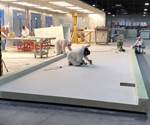ACMA, composites experts testify for more resilient infrastructure
Industry leaders testified to the U.S. Congress for research and use of advanced materials to combat climate change-related infrastructure damage.
On May 21, composites experts met in Washington D.C. to testify before the Subcommittee on Investigations and Oversight of the U.S. House of Representatives Committee on Science, Space, & Technology, during a hearing focused on preparing America's transportation infrastructure for climate change.
The testifying experts included Jason Averill, chief of the materials and structural systems division at the National Institute of Standards and Technology (NIST), Susanne DesRoches, deputy director for infrastructure and energy at the New York City mayor's Office of Resiliency and Office of Sustainability, Scott Reeve, president of Composite Advantage LLC and member of the American Composites Manufacturers Association (ACMA), and Gregory Winfree, director of the Texas A&M Transportation Institute (TTI).
The experts testified that challenges facing U.S. infrastructure due to climate change — such as damage caused by hurricanes, rising sea levels, high winds and other weather-related stresses — require more robust research efforts and increased use of advanced technology and materials, including composites.
"Greater use of composites will allow infrastructure to be more resilient in the face of these challenges,” says Scott Reeves, president of Composite Advantage.
According to their testimony, composites and other advanced materials offer environmental benefits that could have a positive impact on climate change. For example, composites have lower embodied energy, meaning they require less energy to produce. Because they are longer lasting than alternative options, they need to be replaced less and therefore manufactured and constructed less often. Because composites are lighter, they also require less fuel consumption per unit for transportation and installation.
“Composite materials like those being manufactured by Composites Advantage and other members of the American Composites Manufacturers Association are already being used to rebuild and repair our crumbling infrastructure and corroding assets. This is a great example of American innovation rising to meet the challenges facing our nation,” says Ralph Norman (R-SC), ranking member of the subcommittee. Norman adds that his home state of South Carolina, which sustained historic damage from hurricanes over the past several years, needs a more reliable, resilient infrastructure.
"Robust research efforts must be put into place to change the traditional ways we design, build, and maintain our infrastructure. More innovative research-based and data-driven solutions are required to make significant progress in learning how to build and maintain our infrastructure to last longer and withstand extreme weather events,” says Winfree.
NIST is currently working to improve the resilience of American communities through research of advanced materials, including enhanced traditional materials like reinforced concrete and cement as well as the development of tools standards and guidelines. Averill testified that NIST is conducting research with industry partners, including ACMA member companies, to build an advanced composites roadmap to move the U.S. closer to using advanced composites for a more resilient infrastructure.
ACMA also continues promoting more resilient infrastructure through efforts like the Innovative Materials in American Growth and Infrastructure, Newly Expanded Act (IMAGINE) that promotes the use of composites and advanced materials and increased research funding. (Read “Composites in infrastructure: IMAGINE that!” for more.)
Related Content
-
JEC World 2023 highlights: Recyclable resins, renewable energy solutions, award-winning automotive
CW technical editor Hannah Mason recaps some of the technology on display at JEC World, including natural, bio-based or recyclable materials solutions, innovative automotive and renewable energy components and more.
-
Plant tour: Daher Shap’in TechCenter and composites production plant, Saint-Aignan-de-Grandlieu, France
Co-located R&D and production advance OOA thermosets, thermoplastics, welding, recycling and digital technologies for faster processing and certification of lighter, more sustainable composites.
-
Natural fiber composites: Growing to fit sustainability needs
Led by global and industry-wide sustainability goals, commercial interest in flax and hemp fiber-reinforced composites grows into higher-performance, higher-volume applications.

.jpg;width=70;height=70;mode=crop)













